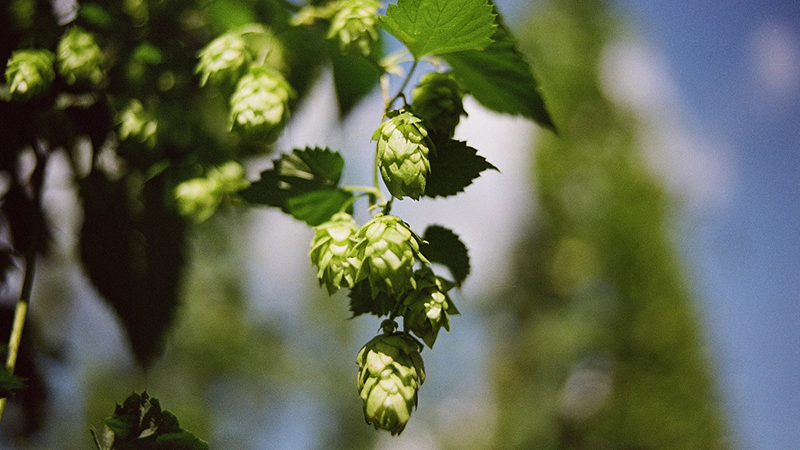
Brewers and hop merchants say demand for organic beer and locally-sourced ingredients has accelerated since the pandemic, but there is a lack of UK-grown organic hops with currently only three such growers.
Hops are notoriously vulnerable to disease and pests in the UK’s temperate climate, leaving conventional growers heavily reliant on a dwindling number of agrochemicals, and organic growers facing two-in-five crop failures.
To tackle this issue, the field lab, run through the Innovative Farmers programme, is bringing hop growers together with the Organic Research Centre to co-design practical on-farm research.
“This is a fantastic opportunity for the organic hop sector to work together and represents a whole supply chain approach with farmers, breeders, merchants, and a brewery collaborating to evaluate new hop varieties for organic farming based on everyone’s needs including the market that is often excluded from this kind of research but that is so essential in translating strong field performance of the crop into a commercially viable endeavour. I am very excited to be helping support this work and look forward to learning about the full potential of these new hop varieties with the field lab group”
Dominic Amos, Senior Crops Researcher, ORC
“UK-grown organic hops are very difficult to get hold of, and the challenge of growing them is the largest barrier to increasing production of UK organic beer,” says Greg Pilley, field lab coordinator and founder of Stroud Brewery, one of only five dedicated organic breweries in the country.
“By collaborating as a supply chain, we’re aiming to identify varieties that farmers can grow more confidently, and as a brewer I’d like to have regular UK supplies of organic hops – there is also a huge variety of flavours to tap into, which could help British brewers create more distinctive products.”
It’s hoped the research, which involves two growers, the breeder Charles Faram, Stroud Brewery, and River Cottage, could benefit conventional growers too, adds Helen Aldis, programme manager at Innovative Farmers.
“We hope that if new disease resistant hop varieties are found that can grow effectively in a UK climate then more growers will be encouraged to grow them both in organic and conventional systems with the latter being able to confidently reduce their reliance on agro-chemicals, says Helen.
Fourth generation hop grower and mixed farmer, John Walker, in Worcestershire, is one of the farmers involved in the project, and is trailing three hedgerow varieties.
“Organic hops are a real challenge,” says Mr Walker. “They aren’t very reliable and although we get a decent premium, you get a lower yield. Pests and disease are a real problem, the main ones being damson hop aphids, downy and powdery mildew, Verticillium Wilt and two-spotted spider mite.
“The varieties I’m trialling are all resistant to aphids and we hope Verticillium Wilt, but I’m hoping to have an ongoing programme of trials as we need to find more than one variety. Brewing trials will be done as we go along to make sure that they have a desirable flavour in the beers.”
A lack of genetic diversity is one of the main drivers of disease and pest vulnerability in hops, started by a consolidation of breweries and varieties post-WW2 to feed a more commercial beer industry.
“In its heyday in 1865, there were 77,000 acres of UK hops being grown, but now it’s less than 2,000, and we’re down to about 50 growers and 25 varieties,” says Will Rogers, group technical director at Charles Faram, a grower-owned hops breeder, which sells about 70% of the UK’s hop crop.
“It’s a very specialist crop to produce and currently for organic farmers we expect at least a 40% crop loss over five years. The lack of diversity is also limiting flavours for brewers”
Mr Rogers says the company is receiving a growing number of enquiries about organic hops, particularly from craft brewers, but currently most organic hops are imported, particularly from Belgium, Germany, and New Zealand.
“We see an opportunity for organic hops in the UK but also for export,” adds Mr Rogers. “There are some markets – France in particular – where organic provenance is booming.”
To tap into the growing UK market, Stroud Brewery plans to use the hop varieties identified by the field trial in three new organic beers made in collaboration with the rural cookery school and organic food brand, River Cottage.
Hugh Fearnley-Whittingstall, cook, broadcaster and founder of River Cottage, will launch the beers with Stroud Brewery this summer.
“Brewing and drinking beer is one of the stitches in our cultural fabric,” says Hugh “and we are much enjoying our collaboration with the brilliant team at Stroud Brewery.
“We hope and expect to see growing interest in sustainably produced beers that support UK farming and livelihoods, biodiversity, wildlife, and good agricultural practice – these new beers will give drinkers the chance to choose organic, and British, and to be part of this mission.”
Get the latest updates from the organic hops field lab
To keep informed of how this field lab and others are progressing sign up and become a member of the Innovative Farmers’ network. Got your own idea for a field lab? Submit it here and we’ll pin it on our online pinboard.
